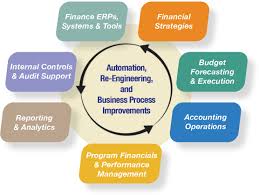
Exploring Various Ways to Finance Your Business
Exploring Different Ways to Finance Your Business
Starting or expanding a business often requires adequate funding. Here are some common ways entrepreneurs can finance their ventures:
Self-Funding:
Using personal savings or assets to finance your business is a common starting point for many entrepreneurs. This method gives you full control over your business without incurring debt.
Bank Loans:
Traditional bank loans are a popular choice for financing a business. Banks offer various types of loans, such as term loans, lines of credit, and Small Business Administration (SBA) loans.
Angel Investors:
Angel investors are individuals who provide capital in exchange for ownership equity or convertible debt. They often offer expertise and valuable connections in addition to funding.
Venture Capital:
Venture capital firms invest in high-growth potential startups in exchange for equity. While venture capital can provide significant funding, it often involves giving up some control of the business.
Crowdfunding:
Crowdfunding platforms allow entrepreneurs to raise funds from a large number of people online. This method can be an effective way to validate your business idea and generate early revenue.
Grants and Competitions:
Government grants, nonprofit organizations, and business competitions offer funding opportunities for businesses in specific industries or with innovative ideas. These sources of funding may not require repayment.
Friends and Family:
Borrowing money from friends and family members is a common way to finance a business, especially in the early stages when traditional financing may be harder to obtain.
No matter which financing option you choose, it’s essential to carefully consider the terms, risks, and potential impact on your business before making a decision.
7 Common Questions About Financing Your Business: Exploring Funding Options
- What are the different ways to finance a business?
- How can I self-fund my business?
- What types of bank loans are available for financing a business?
- What is the role of angel investors in financing a business?
- How do venture capital firms provide funding to startups?
- What crowdfunding platforms can I use to finance my business?
- Are there grants or competitions that offer funding for businesses?
What are the different ways to finance a business?
When exploring ways to finance a business, entrepreneurs have several options to consider. From self-funding using personal savings to seeking bank loans, angel investors, venture capital, crowdfunding, grants, or support from friends and family, there are diverse avenues available for obtaining the necessary capital. Each financing method comes with its own set of advantages and considerations, such as control over the business, potential equity dilution, repayment terms, and access to expertise and resources beyond just funding. It’s crucial for entrepreneurs to assess their financial needs and goals carefully before deciding on the most suitable financing approach for their business venture.
How can I self-fund my business?
When considering how to self-fund your business, one common approach is to use personal savings or assets to provide the initial capital needed. By investing your own money into the business, you retain full control over decision-making and avoid accruing debt from external sources. Additionally, some entrepreneurs may choose to leverage personal assets such as retirement savings or home equity to finance their ventures. It is important to carefully assess your financial situation and consider the risks involved in self-funding, ensuring that you have a solid plan in place for managing cash flow and sustaining the business in the long term.
What types of bank loans are available for financing a business?
When considering bank loans as a financing option for your business, it’s important to be aware of the various types of loans that banks typically offer. Common types of bank loans for financing a business include term loans, lines of credit, and Small Business Administration (SBA) loans. Term loans are structured with a fixed repayment schedule over a set period, providing businesses with a lump sum of capital that is repaid with interest. Lines of credit offer businesses access to a predetermined credit limit that can be drawn upon as needed, providing flexibility in managing cash flow. SBA loans, guaranteed by the Small Business Administration, are designed to support small businesses by offering favorable terms and lower down payments compared to traditional bank loans. Understanding the differences between these types of bank loans can help you choose the financing option that best suits your business needs and goals.
What is the role of angel investors in financing a business?
Angel investors play a crucial role in financing a business by providing capital to early-stage startups in exchange for ownership equity or convertible debt. Beyond financial support, angel investors often offer valuable expertise, guidance, and industry connections to help entrepreneurs navigate the challenges of building a successful business. Their involvement can bring credibility to a startup, attract additional funding from other investors, and accelerate growth opportunities. Angel investors are known for taking calculated risks on innovative ideas and emerging businesses, making them instrumental in fueling entrepreneurship and fostering innovation in the business world.
How do venture capital firms provide funding to startups?
Venture capital firms provide funding to startups by investing in exchange for equity ownership in the company. Typically, startups pitch their business ideas to venture capital firms, who then conduct thorough due diligence to assess the potential for high returns on their investment. If the firm decides to invest, they negotiate terms such as valuation, ownership stake, and any conditions attached to the funding. Once an agreement is reached, the venture capital firm provides the startup with the necessary capital to fuel growth and expansion. In addition to financial support, venture capital firms often offer strategic guidance, industry connections, and mentorship to help startups succeed in a competitive market landscape.
What crowdfunding platforms can I use to finance my business?
When considering crowdfunding platforms to finance your business, there are several popular options to explore. Platforms like Kickstarter, Indiegogo, and GoFundMe are well-known for helping entrepreneurs raise funds for their ventures through contributions from a large pool of online backers. Each platform has its own set of rules, fees, and audience demographics, so it’s essential to research and choose the one that aligns best with your business goals and target audience. Additionally, niche platforms like StartEngine or SeedInvest cater to specific industries or types of businesses seeking investment. By leveraging the power of crowdfunding platforms, you can tap into a diverse network of potential supporters who believe in your business idea and are willing to contribute financially to help bring it to life.
Are there grants or competitions that offer funding for businesses?
Yes, there are grants and competitions that offer funding for businesses. Government agencies, nonprofit organizations, and private entities often host competitions or provide grants to support innovative business ideas or ventures in specific industries. These funding opportunities can be a valuable source of capital for entrepreneurs looking to start or grow their businesses without taking on debt. By participating in these competitions or applying for grants, businesses have the chance to receive financial support, gain exposure, and access valuable resources that can help them succeed in their respective industries. It’s important for entrepreneurs to research and identify relevant grant programs and competitions that align with their business goals and values to maximize their chances of securing funding.



